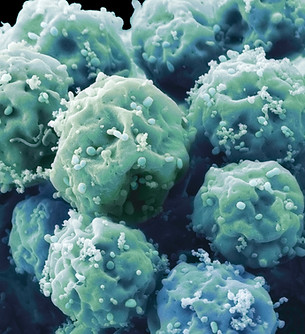Dr. Derfogail Delcassian
Lab @ BioE UC Berkeley
In 2021, the Delcassian Research Lab moved to the BioEngineering Department at UC Berkeley (California USA). Our research focuses on Immunoengineering- the design of biomaterials that control immune cell behaviour. We have an enthusiastic and supportive lab culture working across disciplines including chemistry, materials science, nanoparticle systems and immunology. We are lucky to work with a great team of global collaborators to develop 3D biomaterials, drug and gene delivery, and artificial lymph nodes to generate cell therapy products. If you are interested in joining the team, please review openings below, and email Dr. Delcassian directly with a CV and cover letter detailing your research interests.

Anti-cancer vaccines
Training the immune system to fight cancer remains challenging. In this project, we're delivering genetic instructions to educate the immune system and vaccinate against common cancers. mRNA is delivered in carefully designed lipid nanoparticle systems. This approach trains the immune system to attack cancer. By priming the immune system towards an anti-tumour phenotype, we can better protect against certain cancers.

3D printed transplant organs
We are designing "immune stealth" biomaterials to protect transplants (stem cell derived) from immune rejection. These systems use anti-fibrotic materials to re-direct immune cell behaviour in the transplant niche. By combining these materials with 3D printing, we can rapidly screen the effect of geometry and material properties on transplanted cell function and host immune attack.

Immune nanoparticles
We are developing nanoparticles which can target cells of the immune system. These nanoparticles can cross cell membranes, and allow us to deliver drugs or genetic instructions directly to immune cells. We are using these systems to chance immune cell phenotypes and study how this impacts disease progression.

Biomimetic interfaces
Immune cells use input signals to choose how to respond to other cells and their environment. We can group these input signals into four classes; 1) nanoscale receptor engagement on cell surfaces, 2) physical and topographical properties of the environment, 3) soluble molecules and their interaction with recognition receptors, and 4) local genetic cues which can be processed alter gene expression. These signals can be used to communicate with and instruct cells. My work focuses on making biomaterials which mimic these signals, to deliver them back to immune cells. In this way, we can communicate with cells and train immune cells to respond to our instructions.

Controlled T cell expansion
Many new cancer therapies involve the transplant of helpful immune cells grown in the lab. Scaling up cell expansion and differentiation of these cells can be tricky. We're focused on understanding how to train these cells to fight cancer. We are developing new materials to grow T cells outside of the human body before they are re-infused into patients. These materials direct T cells towards desired phenotypes before re-infusion.

Immunology in space
Space flight has been shown to impair native immune cell function leaving astronauts at risk of many disorders including impaired wound healing and cancer. In an off-world setting, these complications could be fatal. To support longer space flight and potential off-world colonisation, we need to understand how and why the environment in space impacts the immune system. More importantly, we need to be able to develop tools to understand and monitor changes that space-specific stimuli (radiation, microgravity) induce in immune cells, and therapies that can redirect aberrant immune cell behaviour. We are developing tools to explore immunology in space.

Targeted drug delivery
We are developing therapies to replace systemic immune suppression in patients following organ transplants. Most patients take drugs daily to suppress their immune systems and reduce rejection. This can lead to unwanted side effects. We have developed micro-particle systems to deliver anti-rejection drugs directly to the transplant niche. These systems help to extend transplant graft lifetimes and reduce transplant rejection and unwanted side-effects.

